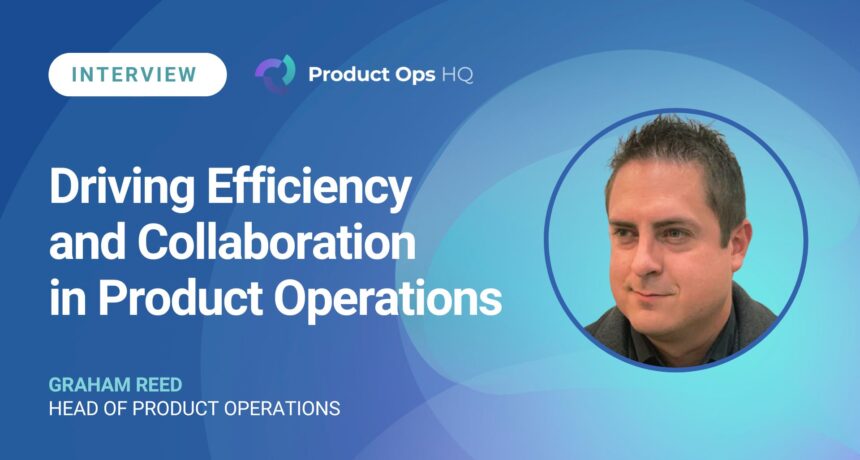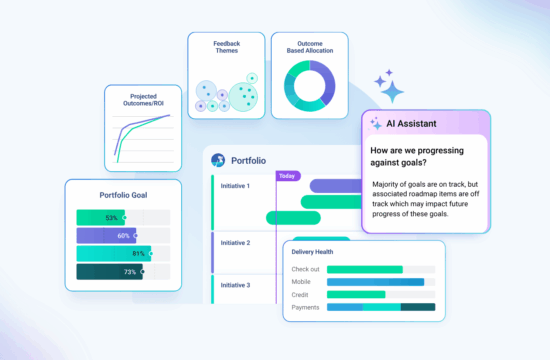This blog post was created in partnership with the “Product Ops HQ community”, the fastest-growing community where product operations professionals gather to connect, share knowledge, and learn.
Product Operations is gaining importance in business, and organizations are discovering its benefits. In this interview series, we explore best practices from Product Operations Leaders and Responsive Product Portfolio (RPPM) advocates. RPPM is a framework that allows product-led organizations to compete more effectively. It connects objectives, customer needs, products, and resources for faster value delivery and increased product return. Join us to learn key insights and tips for success in Product Operations.
Interview with Graham Reed
Welcome to our exclusive interview with Graham Reed, a veteran product manager and product leader with over 10 years of experience. Graham has recently ventured into the realm of Product Operations, leveraging his expertise in building functions from scratch. Currently at Cobalt, he is spearheading the growth of the Product Operations function from 1 to 2 and beyond. His passion lies in promoting, defining, and raising the Product Operations function globally, and along with other pioneers, have created a central hub of resources for practitioners and hirers alike.
In addition to his contributions to the field, Graham is deeply committed to the well-being and mental health of product professionals and has established a community that specifically caters to the mental well-being of product people everywhere. Graham’s passion for both Product Ops and mental health initiatives showcases his holistic approach to creating thriving product ecosystems.
What was your role before you became a Product Operations professional? How long have you been in the Product Ops role?
Prior to Product Operations, I was a self-taught product manager for many years, moving up through the ranks to leading teams of PMs, building SaaS and apps covering fintech, ed-tech, communications, data platforms, language apps, and databases. I have been in Product Ops for about 2 years now.
What are the biggest challenges facing your product teams?
Collaborating across teams on projects and shared areas of the product is an issue for sure. Teams are brilliant in their silos and their own ways of working, but can struggle when it comes to alignment across the teams, and as well collaborating across the rest of the business.
We invest heavily in this through other teams, but the biggest challenges are around standardizing this across all teams, across the business and across the variety of existing processes each team follows.
How does your team/management measure your success as Product Ops?
Largely, Product Ops is measured through the positive feedback from the various teams around the business – their acceptance and happiness with new or enhanced processes, ways of working, new facilities made available to them, etc. This is not just focused on the product division, but other teams’ interaction with the product function at Cobalt. In addition, success is measured by the increased efficiency of the team’s realized outcomes (again, largely this is the outcomes of the product teams), and the measures of success are by-proxy.
It would be easy to assume that metrics are an easy way to prove success within Product Ops – how many users of a process, how many page views, how many forms completed. But Product Ops is about people, not products, and so success measurement starts with a qualitative element.
In your experience, how can Product Ops help establish an outcome-focused practice?
Product Ops is an enabling role. A role to enable, predominantly, product teams to do their best work, and be supported by a business aligned to that work in the most efficient ways possible.
The outcomes to be focused on are set, by company goals, product leadership and management – Product Ops facilitates the alignment of those, reminds teams to be aligned, checks and balances and even questions in a ‘devil’s advocate’ role to prompt and push product teams to stay on the path. This includes reminders and prompts and frameworks to focus on bigger-picture outcomes rather than the journey to get there in more specific outputs.
This can include templates designed to relate enhancement and changes back to established outcomes, division or company goals, OKRs etc. But the establishment of any of this is done in support of product leadership, not in spite of.
Other than product and engineering teams, what other groups (in the company and externally) do you work closely with?
All teams. Period.
In fact, some of the best work I have implemented has been with the detailed involvement of the commercial teams, for the benefit predominantly of the commercial teams and their interaction with product.
Product Ops in a product-led SaaS business spans the entire company, ensuring everyone has access to everything they need to do their specific job and driving success for the business as a whole. We work on implementations and improvements that might cause more work for one team, but overall providing a net-positive outcome that is best for business (though of course, we try not to cause more work for anyone!).
The biggest advocates for product operations are those that can recognize there are better ways to work, that want to improve, and that work for the business overall, and not just themselves or just their team.
Keeping up with industry trends and changes in customer needs is a never-ending task, what methods do you use to stay informed? Is there a particular source (website, book, podcast, expert…) you recommend?
I listen to other practitioners, regardless of their experience in the role, number of podcasts they are on or followers they have. Those in the thick of it are those innovating on a daily basis. I speak with them and we share ideas. There are too many to mention, but those involved with me in the creation of www.productopsprofessional.org are some excellent individuals. And in the creation of thi, we hope to crowd-source the definitive hub of Product Ops knowledge and resources and make it a source people know and trust.
LinkedIn has some useful information from time to time (when people are not using ideas coated as standards for self-promotion), but more for finding those practitioners to engage with one to one.
Of course, the ProductOpsHQ community is collecting many of the world’s best practitioners too and facilitating brilliant conversation and debate!
We hope you found this interview with Graham Reed informative and insightful. Want to learn more? Connect with him on Linkedin.
Are you seeking to elevate your organization’s Product Operations to the next level? Dragonboat, the industry-leading platform for product portfolio management, can help you get there. Streamline processes, drive better outcomes, and stay ahead of the competition. Seamlessly connect your OKRs, customer insights, and product initiatives in one centralized source of truth. Book a demo today and see how Dragonboat can help take your organization’s success to the next level.



